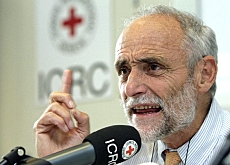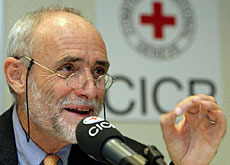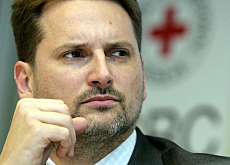ICRC warns of worsening crisis in Darfur

The Swiss-run International Committee of the Red Cross (ICRC) says it is increasingly concerned about deteriorating conditions in Sudan's Darfur region.
Presenting the ICRC’s annual report in Geneva on Thursday, president Jakob Kellenberger said the humanitarian and security situation was “critical”, with hundreds of thousands of people affected.
“Since the beginning of the year the security environment in Darfur has become more difficult, even for us. We have had many more security incidents than in the two years previously,” he said.
The ICRC has made Sudan its priority country for the third year running, with SFr128 million ($105 million) earmarked for operations this year. But Kellenberger said there were areas where the organisation’s staff no longer had access.
More than 180,000 people have been killed and millions displaced in Darfur since rebel groups, made up of ethnic Africans, rose up against the Arab-led Sudanese government in 2003.
Kellenberger added that he was unsure what effect, if any, the peace deal struck in the Nigerian capital Abuja at the beginning of May would have on conditions on the ground.
On the controversial issue of whether an international peacekeeping force should replace African Union troops in the region, Kellenberger said he was in favour of anything that improved security there.
Somalia
The ICRC also announced plans to expand medical operations in Somalia, which has been hit by drought and recent fighting between Islamic militias. Kellenberger said the country was one of the trouble spots that he was most concerned about.
Since clashes first erupted in mid-February there have been more than 300 deaths and 1,700 wounded have been treated in hospital, according to the ICRC.
Earlier this week Mogadishu’s Keysaney hospital was occupied by armed fighters, despite repeated calls from the ICRC and the Somali Red Crescent Society for medical facilities to be spared.
Kellenberger added that medical relief was likely to be stepped up in the Palestinian territories. This week the Swiss Agency for Development and Cooperation sent two experts to assess the Palestinian Authority’s crisis-hit health sector and released an initial SFr1 million to buy medicines for cash-strapped hospitals.
Secret detainees
The ICRC president, who recently returned from a visit to the United States to discuss the thorny issue of access to detainees held in secret locations, reiterated that access to people around the world in need of protection and assistance remained a priority for the Geneva-based organisation.
He deplored the fact that “certain spots are off limits” and admitted that the ICRC had not made progress in recent months on the issue of “undisclosed detention”.
He said access to prisoners was tricky in a number of countries “not least in the Arabic-Islamic world”.
Questioned about the alleged massacre of civilians by US forces at Haditha in Iraq in November, Kellenberger commented that it was “important to respect international humanitarian law, not least the rules of conduct on hostilities – but that is valid for everybody”.
swissinfo, Adam Beaumont in Geneva
The ICRC’s annual report says 2005 will be remembered as a year of major natural disasters, notably the Indian Ocean tsunami, the South Asia earthquake, drought in Niger and hurricanes in the Caribbean.
According to the Geneva-based organisation, armed conflicts – most of them internal – inflicted a heavy toll on civilians through killings, injuries, displacement, rape, detention and forced labour.
The ICRC says it has improved its ability to react quickly to crises around the world and plans to further increase its capacity for rapid deployment in the future.
The ICRC’s budget last year was SFr911 million – up from SFr782 million in 2004.
In 2005 it provided food for a million people and emergency supplies such as tents and blankets for three million people.
The ICRC also visited 528,000 people in 2,600 detention centres in 76 countries.

In compliance with the JTI standards
More: SWI swissinfo.ch certified by the Journalism Trust Initiative


You can find an overview of ongoing debates with our journalists here. Please join us!
If you want to start a conversation about a topic raised in this article or want to report factual errors, email us at english@swissinfo.ch.